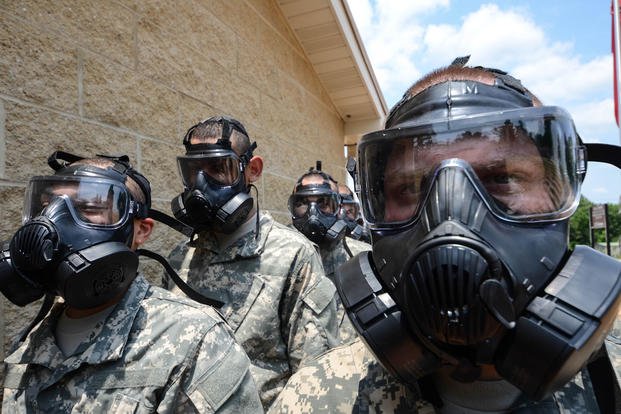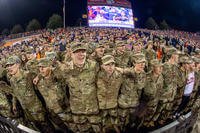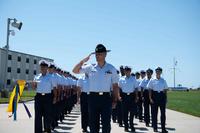In my book "The Ultimate Basic Training Guidebook," I discuss the importance of chemical gear. Every recruit who goes through basic training undergoes nuclear, biological and chemical (NBC) training and is subjected to training in the gas chamber. The reason for all this unpleasantness? To gain confidence in your NBC equipment (i.e., your protective mask). Confidence in your equipment will mean a great deal if you need to use it in a real-life situation. Read on, learn about how to handle the gas chamber experience and just remember one thing: Worrying about this training will be worse than the actual training!
What Is the Gas Chamber?
The gas chamber is a room that has a controlled concentration of CS (orto-chlorobenzylidene-malononitrile) gas, more commonly known as tear gas. Tear gas is the active ingredient in Mace and used for self-defense and for riot control by the police. Tear gas is an irritant; specifically, it irritates mucous membranes in the eyes, nose, mouth and lungs, causing tearing, sneezing, coughing, etc.
The Process
On or about the second week, you will be subjected to the gas chamber. You will follow your daily schedule, so if you are scheduled to go to the gas chamber in the afternoon, I suggest eating a light lunch. Taking a few breaths of tear gas on a full stomach is not a good feeling.
Before entering the gas chamber, you will be trained on how to fit your protective mask and chemical gear. Learning how to clear your mask is important. Some recruits fail to pay attention to these instructions and regret their lack of attention while in the gas chamber.
A number of different things can occur while you are in the gas chamber. I will explain to you the most common method drill sergeants use to move the recruits through the gas chamber.
You will line up in a group (usually 5 to 15 recruits) outside of the gas chamber door. Your group will be asked to file into the gas chamber. Once inside the gas chamber, you will be joined by a drill sergeant (or several of them). The room will be very foggy. The fog you see is CS gas, and you may smell it slightly through your mask. You will see a drill sergeant with a coffee can next to a table. This coffee can will have a flame inside -- this is the CS gas burning. A drill sergeant will touch your shoulder and ask you to lift your mask and state your name, rank and Social Security number. Many recruits get nervous and forget the answers to these simple questions. If you remain calm, you will do fine.
As the drill sergeants touch your shoulder, take in a deep breath, close your eyes, lift your mask, answer the questions in one breath, put your mask back on and clear the mask. This part of the gas chamber is not difficult if you stay calm. However, over the years, drill sergeants have learned that recruits accomplish this without inhaling any CS gas. The drill sergeants want you to inhale the gas and recognize the importance of chemical gear. Therefore, after your whole group is finished stating their name, rank and Social Security number, they will ask you to take off your mask and file out in order without closing your eyes.
The Treatment
As you are exiting the gas chamber, your eyes will fill with water, and mucous will fill your lungs and face. The best treatment is air. Immediately upon exiting the gas chamber, you should open your eyes. This will seem like a hard task under the circumstances, but keeping your eyes open in fresh air will allow any discomfort to dissipate very quickly. I cannot emphasize enough to not touch your eyes. You will no doubt feel the urge, but touching and/or rubbing your eyes is the worst thing you can do. Take deep breaths of air with your arms over your head, and you will be surprised how quickly the CS leaves your system. In less than a minute, you will be nearly, if not, 100% better.
Smile Pretty
Typically a historian will follow your basic training company for nine weeks. At the end of basic training, this historian will have a book for sale filled with pictures of all the events you have accomplished. The pictures from the gas chamber are not exactly pictures you want your friends and family to see. You will probably have drool on yourself, and it will look like you just sneezed 47 times in a row without access to tissues. So as you exit the gas chamber, look for the historian and head in the other direction. Don't forget to put a pack of tissues in your cargo pocket before you enter the gas chamber!
SGT Michael Volkin is the author of "The Ultimate Basic Training Guidebook: Tips, Tricks and Tactics for Surviving Boot Camp."
Interested in Joining the Military?
We can put you in touch with recruiters from the different military branches. Learn about the benefits of serving your country, paying for school, military career paths and more: sign up now and hear from a recruiter near you.













